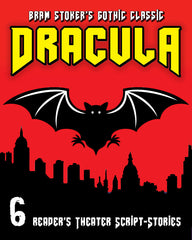Monsters: Frankenstein, Dracula, Jack the Ripper, Dr. Jekyll and Mr. Hyde
Lurking behind the stuffy exterior of society is the heart of a monster. During the Regency-Victorian time period, the greatest literary monsters were born. The very names of these creatures conjure up nightmare images: Frankenstein's monster, Count Dracula, Dr. Jekyll and Mr. Hyde, and the Invisible Man. All of these monsters are here—including a few extra! Jack the Ripper, a real-life monster, is also featured. Use these materials to let your students experience these classic tales of horror.
GOTHIC ELEMENTS PRESENTATION This presentation gives an overview of common elements of Gothic Literature.

FRANKENSTEIN SCRIPT-STORY COLLECTION
Bring Frankenstein to life with this collection of five Reader’s Theater script-stories! The story of a misunderstood monster pitted against his unfeeling creator, Frankenstein is just as relevant today as it was 200 years ago—exploring deep-thinking questions like, “Should there be limits on science? And are monsters born or made?” If you're not sure this type of assignment will work in your classroom, try "Frankenstein: Part I" for FREE by clicking here.
FRANKENSTEIN DISCUSSION QUESTIONS Use these questions to help your students analyze the deeper themes of Mary Shelley's masterpiece.
FRANKENSTEIN VS. JURASSIC PARK One of the things I love about the classics are their timeless themes. What do reanimated corpses and genetically-revived dinosaurs have in common? Quite a bit actually—as this excerpt from a scholarly article explains.
JOHN MILTON'S PARADISE LOST An adaptation of stories from the Book of Genesis, John Milton's great epic Paradise Lost grapples with weighty questions: Why is there evil in the world? What is the role of good and evil? Why do humans have free will? This 9-page Reader's Theater script-story adapts the first part of Milton's epic, giving students an overview of the poem's main characters and themes, as well as a taste for Milton's poetic language. Satan, decisively defeated by God, decides to build a capital in hell called Pandemonium and make it his personal mission to corrupt God's perfect creation. The poem addresses concepts of good and evil, free will, and the power of divine grace. Paradise Lost, especially the character of Satan, inspired Mary Shelley's characterization of Frankenstein's monster, and the story provides a great tie-in to Shelley's masterpiece. This download also includes a reading guide, key, and anticipatory activity.
JACK THE RIPPER Learn the background of history's most famous serial killer, Jack the Ripper. Compare this real-life monster to the literary monsters from the same time period.
DRACULA SCRIPT-STORY COLLECTION Need a Gothic horror story you can really sink your teeth into? In Bram Stoker’s Dracula, the forces of good face off against an ancient evil—Count Dracula, the lord of the undead, as he travels from his crumbling castle in Transylvania to the teeming city of London in search of fresh blood. Filled with fascinating characters like the resourceful Mina Murray, the knowledgeable Professor Van Helsing, the crazed mental patient Renfield, and the diabolical count himself, the story is equal parts horror, mystery, and adventure. This collection adapts the entirety of Bram Stoker’s original novel into six student-friendly Reader’s Theater script-stories. The world of Dracula will suck you in! You can read "Dracula: Part I" for FREE by clicking here.
DRACULA: PART I (PROSE VERSION) The first portion of Bram Stoker's Dracula is a nail-biting adventure. Even if you don't have time for the full novel, this first portion can really whet your students' appetite to read the novel on their own.
THE STRANGE CASE OF DR. JEKYLL AND MR. HYDE: READER'S THEATER SCRIPT-STORY One part fascinating mystery and one part psychological thriller, The Strange Case of Dr. Jekyll and Mr. Hyde plumbs the depths of human nature to offer up a compelling argument about the nature of good and evil. A classic of British Literature and an early example of science fiction, Dr. Jekyll and Mr. Hyde serves as a warning of the darkness lurking inside each and every one of us.This 19-page collection of two script-stories adapts the entirety of The Strange Case of Dr. Jekyll and Mr. Hyde.
THE INVISIBLE MAN: A READER'S THEATER SCRIPT-STORY Which is scarier—the enemy that you see, or the enemy that you don’t? When the experiments of Griffin, a half-mad scientific researcher, succeed in making him invisible, he uses his newfound power to begin a reign of terror—stealing, assaulting, and murdering until he achieves his goal of total domination. The story ends with a thrilling showdown that pits the forces of good against the deadly powers of the Invisible Man. This new 13-page Reader’s Theater script-story condenses the original novel by H.G. Wells into an entertaining and thought-provoking experience, complete with a 3-page teacher guide that explores the novel’s background as well as its philosophical ideas.
"LOST HEARTS" BY M.R. JAMES Written by one of the world's best tellers of ghost stories, this classic tale is both grim and gruesome. A young orphan is invited to live with his rich, much-older cousin, but ghostly apparitions begin to alert him that his cousin has monstrous motives.
"CANON ALBERIC'S SCRAPBOOK" BY M.R. JAMES This Victorian horror story is more of a slow burn than a flash fire, but the payoff is pure creepiness. A visitor to an ancient cathedral discovers a mysterious manuscript that may be home to a centuries-old spirit.
"THE CANTERVILLE GHOST" BY OSCAR WILDE Leave it to Oscar Wilde to turn the typical ghost story on its head. In this hilarious short story an American family moves into a classic haunted house and ends up torturing the ghost who lives there instead of vice versa.






